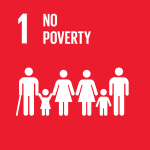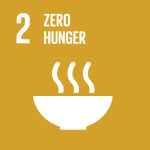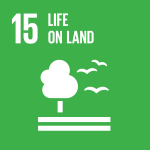
Healthy soils play a vital role in preventing landslides by stabilizing the land with roots and organic matter. They absorb excess rainwater, reduce surface runoff, and help keep hillsides intact during heavy storms.
In Malawi, where climate change is intensifying extreme weather events, these natural defenses are more important than ever. Unfortunately, in many parts of the country, years of deforestation, unsustainable farming and climate change impacts have stripped the land of this natural protection. The consequences were stark in 2023 when Cyclone Freddy battered the country multiple times, triggering deadly landslides and displacing over 500,000 people amid torrential rainfall.
To address these growing risks, the NGO Action for Environmental Sustainability (AfES), with support from the UNDP-Adaptation Fund Climate Innovation Accelerator (AFCIA), has established a farm school that equips smallholder farmers with the skills and tools to adapt to climate change. Through hands-on learning, farmers improve soil health, restore indigenous crops and build sustainable livelihoods.

Student farmers work in the farm school gardens. Photo: AfES
Inside Malawi’s innovative climate-smart farm school
Located in Blantyre, southern Malawi, the AfES farm school spans ten hectares and includes greenhouses, gardens, livestock facilities, fishponds and a solar-powered irrigation system. The school serves as a practical training ground where farmers learn modern techniques in livestock care, agroecology, crop rotation, composting and natural pest management.
“The trainings were amazing. Using the techniques I acquired at the farmer school there has been a tremendous improvement in the health of my goats and pigs, I now have no issues with the losses I previously had during goat kidding and pig farrowing. My crops are very healthy due to improved soil management techniques and the pest and diseases management.” – Florence Kazembe, a lead farmer who participated in 2024
Since opening in 2023, the farm school has directly improved the food security and nutrition of 25 smallholder families, training 150 individuals. Participants report early results: healthier animals, lower spending on synthetic inputs and a three percent increase in income within just four months.
“We are not going to introduce anything new, but we are going to sustain both practices that are very sustainable in agriculture crop production and animal husbandry. At the very early stage, this approach has already proven to be more impactful and attractive, it is a very realistic model that allows the smallholder farmers to appreciate various techniques.” – Daniel Mwakameka, executive director at AfES

A farmer samples fish from the farm school’s fishponds. Photo: AfES
Training women farmers for agribusiness leadership
A remarkable outcome of the initiative has been the strong participation of women—who make up 75 percent of farm school students, all under the age of 35.
“It’s interesting to learn that there is division of labour in the agricultural sector here in Malawi, women are farming for food and men for cash. This initiative has come at a very right time where we are engaging women in both food and commercial farming.” – Shakira Msusa, programme manager and climate-smart farm coordinator at AfES
By offering training in agribusiness and connecting graduates to markets, the school helps bridge gender disparities in agriculture. Women gain not just skills but also greater economic agency and influence in decision-making, turning active farmers into leaders in their communities.
“I am still in contact with the trainers at the farmer school whenever I feel that I need to be reminded on certain aspects that I received training in, especially with piggery and goat farming.” – Florence Kazembe, farmer

Farm members feed the fish at the climate-smart school. Photo: AfES
Scaling impact through a ‘train-the-trainer’ model
Building on the success of the first 25 farmers, the initiative is planning to scale up these learnings through a ‘train the trainer’ approach. Graduates become ‘lead’ or ‘champion’ farmers and can set up their own farm as a social enterprise to teach others. Revenue from the farm is used to support activities and future expansion.
“We offer professional services to farmers who have already graduated. We will give them the necessary training to allow them to train other farmers. The replicability is also possible as we generate income from this initiative, some of the products are sold in the local market and these sales can be used to replicate the initiative.” – Daniel Mwakameka, from AfES
The school also nurtures the wider farming ecosystem by producing and distributing 5,000 indigenous tree seedlings—3,650 planted locally and 1,350 sold within Blantyre—to restore biodiversity and reduce market dependency. This innovative approach establishes the small farmers as a model for replication and agents of change.

A capacity building session on climate adaptation at the farm school. Photo: AfES
A scalable model for climate adaptation in agriculture
Agriculture is the backbone of Malawi’s economy, contributing over 30 percent of GDP and 90 percent of export earnings. Yet the country’s vulnerability to climate change threatens both livelihoods and food systems. Improving agricultural productivity must go hand in hand with building climate resilience.
The AfES farm school addresses this challenge directly. By equipping farmers with the knowledge and resources to improve soil health, reduce erosion and restore ecosystems, the school not only enhances livelihoods but also sets a blueprint for sustainable agriculture across the region. As both a training school and a source of income, the farm school has created a replicable model that is already attracting other grants and projecting healthy agribusiness revenue streams.
*
Supported by financial contributions from the Adaptation Fund and the European Union, the UNDP-AFCIA programme has awarded 44 micro and small grants to locally led organizations across 33 countries worldwide, accelerating their innovative solutions to build resilience in the most vulnerable communities.
UNDP-AFCIA is one of two featured programmes under the Adaptation Innovation Marketplace (AIM), a multi-stakeholder strategic platform that promotes scaled-up adaptation at the local level.




